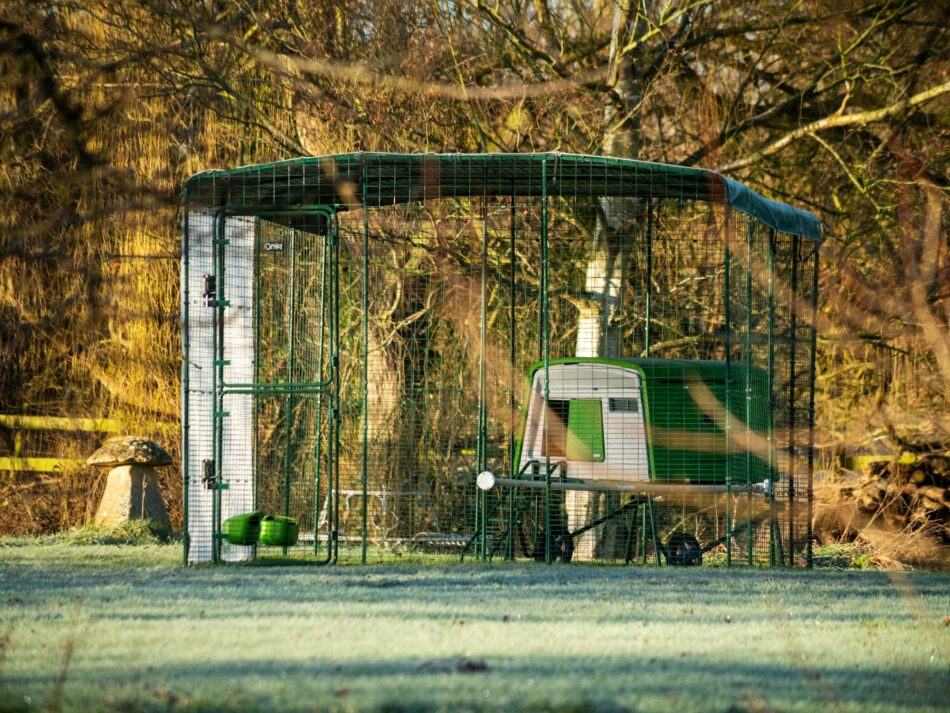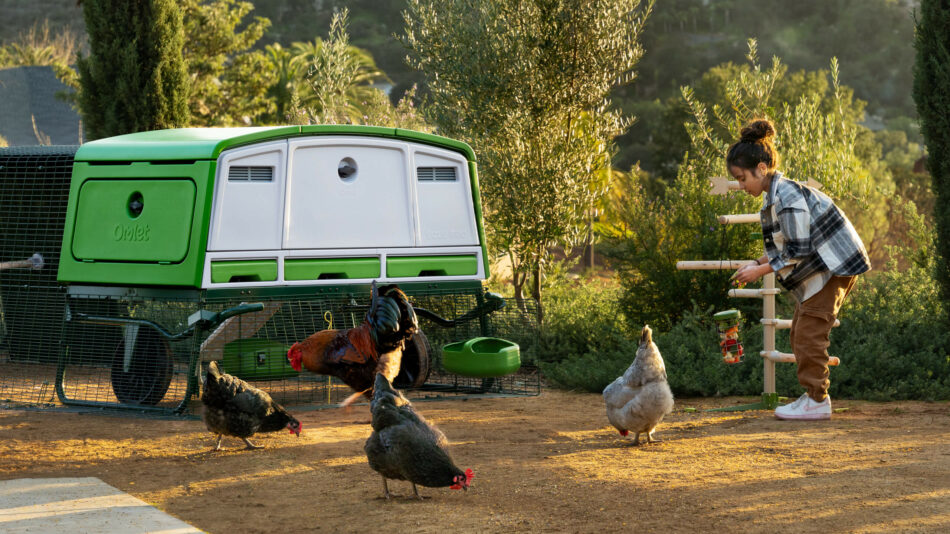Essentials for every chicken keeper
Whether you’re just starting out, or looking to spruce up your setup for spring, there are essentials for every chicken keeper that you should never be without. From flock safety and entertainment to ease of cleaning and maintaining, these chicken keeping must-haves make caring for your hens easy and enjoyable. Here’s everything you need to maintain a healthy, happy flock.
Your chicken-keeping checklist
Keeping chickens is rewarding, fun, and enjoyable. And, with many cities allowing a small backyard flock, chickens are becoming more and more popular in urban areas. These pets pack lots of personality, and lay one of the tastiest superfoods for their humans to enjoy.
Chickens are relatively easy to care for, making them a popular pet choice for keepers of all ages. But to keep them healthy and happy, there are some essentials you must have for your hens. Here’s a checklist of everything you need to keep chickens:
- A chicken coop
- A chicken run or chicken fencing
- Feeder and waterer
- Quality laying feed
- Area for dust bathing
- Bedding for the coop
There are many options when it comes to these items, but there are standout products that turn chicken chores into fun with your flock.
Choosing a chicken coop
If you’re looking for your first chicken coop, or are wanting to upgrade your wooden coop, you’ll want to choose a lasting solution. Eglu Chicken Coops are made of heavy-duty plastic, and never require annual maintenance. And, they can be thoroughly cleaned in just minutes — a feat that wooden chicken coops can’t come close to.
In addition to making chicken-keeping chores a breeze, Eglu coops also keep your flock safe and comfortable. The twin-wall insulation, ventilation methods, and secure construction keep your hens healthy, happy, and protected from chicken predators. And, with their smooth plastic construction, you won’t have to worry about red mites.
Your chicken coop should also have designated areas for laying eggs and sleeping. Nesting boxes should be quiet, and separate from their roosting area, where they will sleep overnight. Provide soft bedding like straw, hay, hemp, or pine shavings in the nesting boxes for your hens to fluff into a suitable spot to lay their eggs.
Free-ranging safely
Your chickens need a safe space to forage and explore during the day. This space can be in a chicken run or in a designated area by using chicken fencing. It’s important to have some boundaries for your flock, even if you choose to let them free range. This will prevent them from sampling plants that may be toxic to chickens, or your prized garden plants. It will also keep them closer to home and help prevent surprise attacks from predators.
Walk in Chicken Runs are fully enclosed, and provide the most protection to your hens. They also give you enough space to walk with your flock, and can be expanded as often as you need. This option is best to protect your chickens against aerial predators like hawks and owls, and to keep bigger predators from digging or pushing into their run.
You can also add an Autodoor to your flock’s coop or run to control how much free-time your hens have. Keep them safe inside their setup during peak predator hours — dawn and dusk. And, with the Smart Control panel, you can control your coop right from your couch or from anywhere in the world.
Feeding your flock
Your chickens rely on you for the bulk of their nutrition. While they get some nutrients from vegetation and insects during foraging, hens need free-choice access to quality laying feed and fresh water. Their feed should contain 16-18% protein, with additional protein of up to 20% offered to support new feather growth during their annual molt. Place your chicken feeders and waterers in an area that’s out of direct sunlight and where it won’t get wet in the rain.
In addition to layer feed, you can offer your flock fresh fruits and vegetables in a chicken treat holder, and scratch grains in chicken peck toys. Treats should only supplement your flock’s regular diet, but you’ll quickly win the hearts of your hens when you offer these delicacies up. Choose protein-packed treats like dried insects, or leafy greens and fresh herbs for the biggest nutritional boost.
Have oyster shells or another calcium supplement available for your hens to access as needed. A lack of calcium in your hens’ diet can cause egg abnormalities like soft or missing shells. If your flock doesn’t have access to fresh earth, you may also need to supplement their diet with grit, which resembles ground up rocks. Chickens don’t have teeth, and grit stays in their gizzard — part of their digestive tract — to help grind up their food for digestion. Chickens normally get adequate substances to replicate this from scratching around in the earth, but flocks in smaller runs or those with substrates in their run need this element to maintain digestive health.
The bathing area
Chickens don’t need water to bathe — in fact, they need dirt to keep themselves clean. Flocks will find loose earth as part of their free-ranging festivities to flop down in and toss dirt all over their feathers. They’ll then pop up, shake off, and preen their feathers. This unconventional style of bathing removes parasites, loose feathers, and other impurities from their skin and plumage.
If your hens don’t free range, you’ll need to provide them with a chicken dust bath. Choose a container large enough to accommodate two hens at once, as this is usually a social event as well a practical one. The container should be deep enough to give your chickens enough space to nestle down in and the sides high enough to contain what they toss into the air.
The base for your chickens’ dust bath can be top soil, untreated contractor sand, or soil from your garden. Other add-ins that create a hen-healthy dust bath include:
- Wood ash from burn piles or fireplaces
- Diatomaceous earth (DE)
- Herbs
Extra items for enrichment
Along with the essentials, there are things that add enrichment and fun to your flock and your chicken-keeping experience. Chicken toys and perches help keep your hens active, and provide you with endless entertainment as you watch them keep their minds and bodies fit.
Weather protection for your chickens’ run will help keep the elements off of them. Chicken run covers offer shade from the sun, and protection from rain and snow. These will also keep their run from becoming a muddy mess in wet seasons.
Consider adding chicken coop wheels and handles to make your coop mobile. A mobile chicken coop can be moved easily to new grass, or in the event of storms or other dangerous conditions. Making your coop mobile also lets you position your hens’ home in the shade or sun for optimal seasonal support.
Omlet and your flock
Maintaining your flock is an enjoyable pastime when you have all the right essentials. Supportive chicken coops, innovative automatic chicken coop doors, and spacious chicken runs and fencing, you’ll be able to create the perfect environment to enjoy with your hens. Create the chicken keeping experience you’ve always wanted when you choose Omlet’s chicken keeping products.
This entry was posted in Chickens


